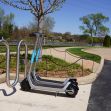Electric scooters are the latest hot transportation trend, with ads promising they are “fast, fun, and easy to ride.” Their “micromobility” offers a “quick and cheap” alternative to cars that demand pricey gas. As a condition of renting a scooter, however, companies require riders to consent to having their routes and locations tracked by an app. E-scooter owners charge renters according to the time and distance they travel. When one rider sued the City of Los Angeles, claiming that their tracking violated his privacy, the Ninth Circuit found that he had no expectation of privacy, even though his data is stored so his travel history can be identified and sensitive trips disclosed.
Circuit Judge Andrew Hurwitz wrote the opinion of a unanimous three-judge panel. His opinion was joined by Circuit Judge Kim McLane Wardlaw and District Judge Lee H. Rosenthal, sitting by designation. It affirmed the decision of Presiding District Judge Dolly M. Gee of the United States District Court for the Central District of California.
Hurwitz began by calling the popularity of e-scooters “a near-overnight invasion, which cluttered sidewalks and interfered with street access.” The City of Los Angeles responded to the dangerous influx by adopting an “e-scooter permitting program” that requires e-scooter companies such as Bird, Lime and Lyft to “disclose real-time location data for every device.” The data is collected because the companies base charges on the distance and duration of trips.
The opinion also explained that rented scooters are “dockless,” meaning they can be left anywhere and can easily be rented by subsequent riders. Accurate tracking by rider is therefore essential.
The case centered on the legality of the Los Angeles Department of Transportation’s (LADOT) app called “Mobility Data Specification (MDS).” All scooter companies must connect the MDS app to riders’ cell phones in order to collect real-time data about where they start and end each trip. MDS data is also preserved by LADOT, raising fears that riders might not want anyone to know about a trip to a marijuana retailer, a visit to a therapist, or any other potentially sensitive voyage.
In essence, MDS will allow a party to “travel back in time” and gather private information. However, when plaintiff-appellant Justin Sanchez used this argument to support his invasion of privacy claims, the court said he has suffered no harm and was only addressing a hypothetical that might reveal sensitive information sometime in the future. The opinion differentiated data that might be sensitive in the future from what has already happened to Sanchez. The opinion stated, “an inference is not a search,” and they said they would not rule on something that might happen in the future.
Despite his fears, the Court found that Sanchez failed to state a claim when he sued LADOT for its e-scooter permitting program. Sanchez claimed that the forced capture and potential disclosure of his travel violate both the Fourth Amendment and California law. Sanchez was represented by the ACLU Foundation of Southern California and others. Their arguments were not persuasive.
The Ninth Circuit first affirmed the District Court’s decision to dismiss Sanchez’s case without leave to amend because LA’s permitting program is not a search under the Fourth Amendment. Hurwitz wrote that Sanchez had “no reasonable expectation of privacy over anonymous MDS location data.” He also said that even if it was a search, it would be legal because it performs an administrative function. Sanchez thus had no valid constitutional claim under either the Fourth Amendment or the California constitution.
LADOT also argued that Sanchez’s suit was based on a hypothetical that might never happen. Sanchez suffered no harm, a critical element in a constitutional claim.
Next, the opinion addressed the key question of whether LADOT’s data gathering program was actually a search under the Fourth Amendment. If it wasn’t a search, there would be no need to determine whether it was reasonable. Hurwitz turned to precedents and compared the Sanchez search to previous precedents concerning invasion of privacy cases by similar technology, including cell phones and GPS devices. In one case, the U.S. Supreme Court ruled that the government could not acquire the cell phone records of a suspect, because such a search did violate the Fourth Amendment.
But cell phones are not MDS data and even though they both use technology, Sanchez’s posed a more serious problem. When he rented the scooter, he gave the scooter company, and thus LADOT, permission to track his movements. Hurwitz wrote, “We have little difficulty finding that Sanchez knowingly and voluntarily disclosed location data to the e-scooter operators. His situation was distinguished from that of a cell phone user whose device provides location information “by dint of its operation, without an affirmative act on the part of the user,” Hurwitz reasoned. Therefore, Sanchez had no expectation of privacy. This is called the “third-party doctrine,” and it is used when someone agrees to “voluntarily disclose location data” to e-scooter operators.
“The location data from MDS,” Hurwitz wrote, “is far afield from the dragnet continuous monitoring of an identified individual’s movements at issue” in other cases used as precedent. He then affirmed the dismissal under California’s Electronic Communications Privacy Act law, as the Court ruled that the law did not permit Sanchez to “bring an independent action to enforce its provisions.” Finally, the justices found that the District Court properly dismissed the complaint without leave to amend because “no additional facts could cure the deficiencies.”
If high gas prices and hideous Los Angeles traffic are providing temptations to try e-scooters, remember that someone will always know where you go. And, like Big Brother, scooter companies and LADOT can now legally follow your tracks.






